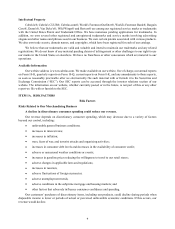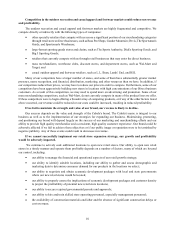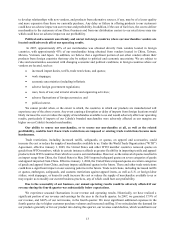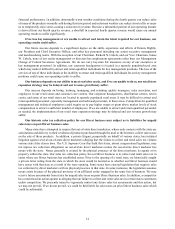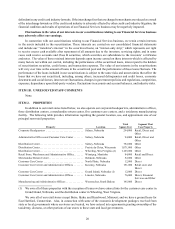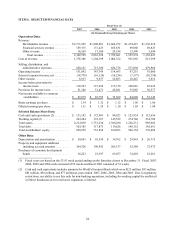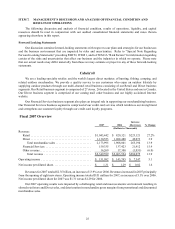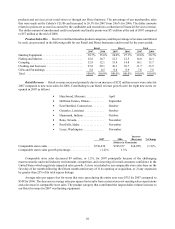Cabela's 2007 Annual Report Download - page 25
Download and view the complete annual report
Please find page 25 of the 2007 Cabela's annual report below. You can navigate through the pages in the report by either clicking on the pages listed below, or by using the keyword search tool below to find specific information within the annual report.19
Economic downturns and social and other factors could cause our credit card charge-offs and delinquencies
to increase, or credit card balances to decrease, which would decrease our profitability.
Economic downturns generally lead to increased charge-offs and credit losses in the consumer finance industry,
which would cause us to experience increased charge-offs and delinquencies in our credit card loan portfolio. An
economic downturn can hurt our financial performance as cardholders default on their balances or carry lower
balances. A variety of social and other factors also may cause changes in credit card use, payment patterns, and the
rate of defaults by cardholders. These social factors include changes in consumer confidence levels, the public’s
perception of the use of credit cards, changing attitudes about incurring debt, and the stigma of personal bankruptcy.
Additionally, credit card accounts tend to exhibit a rising trend in credit loss and delinquency rates between 18 to
30 months after they are issued. If the rate of growth in new account generation slows, the proportion of accounts in
the portfolio that have been open for between 18 to 30 months will increase and the percentage of charge-offs and
delinquencies may increase. Our underwriting criteria and product design may be insufficient to protect the growth
and profitability of our Financial Services business during a sustained period of economic downturn or recession or
a material shift in social attitudes, and may be insufficient to protect against these additional negative factors.
The performance of our Financial Services business may be negatively affected by the performance of
our merchandising businesses.
Negative developments in our Retail and Direct businesses could affect our ability to grow or maintain our
Financial Services business. We believe our ability to maintain cardholders and attract new cardholders is highly
correlated with customer loyalty to our merchandising businesses and to the strength of the Cabela’s brand. In
addition, transactions on cardholder accounts produce loyalty points which the cardholder may apply to future
purchases from us. Adverse changes in the desirability of products we sell, negative trends in retail customer service
and satisfaction, or the termination or modification of the loyalty program could have a negative impact on our bank
subsidiary’s ability to grow its account base and to attract desirable co-branding opportunities with third parties.
Our Financial Services business faces the risk of a complex and changing regulatory and legal
environment.
Our Financial Services business operates in a heavily regulated industry and is therefore subject to a wide array
of banking and consumer lending laws and regulations. Failure to comply with these laws and regulations could
result in financial, structural, and operational penalties being imposed. In addition, as a Visa member bank, our bank
must comply with rules and regulations imposed by Visa. For example, our bank and Cabela’s could be fined by Visa
for failing to comply with Visa’s data security standards.
Changes in interest rates could have a negative impact on our earnings.
In connection with our Financial Services business, we borrow money from institutions and accept funds
by issuing certificates of deposit, which we then lend to cardholders. We earn interest on the cardholders’ account
balances, and pay interest on the certificates of deposit and borrowings we use to fund those loans. Changes in these
two interest rates affect the value of the assets and liabilities of our Financial Services business. If the rate of interest
we pay on borrowings increases more (or more rapidly) than the rate of interest we earn on loans, our net interest
income, and therefore our earnings, could fall. Our earnings could also be adversely affected if the rates on our credit
card account balances fall more quickly than those on our borrowings. In addition, at the end of 2007, approximately
35.5% of our cardholders did not maintain balances on their credit card accounts. We do not earn any interest from
these accounts but do earn other fees from these accounts such as Visa interchange fees. In the event interest rates
rise, the spread between the interest rate we pay on our borrowings and the fees we earn from these accounts may
change and our profitability may be adversely affected.
Credit card industry litigation could adversely impact the amount of revenue generated by our Financial
Services business.
Our Financial Services business faces possible risk from the outcomes of certain credit card industry litigation.
For example, a number of entities, each purporting to represent a class of retail merchants, have sued Visa and several
member banks, and other credit card associations, alleging, among other things, that Visa and its member banks have
violated U.S. antitrust laws by conspiring to fix the level of interchange fees. To date, we have not been named as a


